By Peter Hogness
Nearly 350 faculty, staff and students attended a March 8th PSC Town Hall Meeting on Pathways, CUNY’s top-down overhaul of general education and transfer. About 30 people spoke during an hour-long open mic, criticizing Pathways and demanding an alternative.
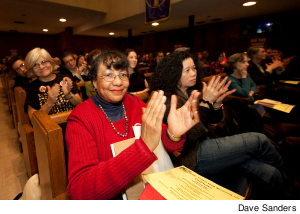 |
The meeting also heard from PSC President Barbara Bowen; Sandi Cooper and Terry Martell, chair and vice chair of the University Faculty Senate; Jamell Henderson, a senator in the student government at BMCC; Manfred Philipp, professor of chemistry and PSC chapter chair at Lehman College; and Saavik Ford, associate professor of astronomy at BMCC.
The campaign for an alternative to Pathways includes a lawsuit, a petition drive, and a possible action at the April 30 meeting of the Board of Trustees. “This is a fight we can win,” Bowen said to applause.
More than 2,500 people signed the union’s petition in its first two days. “Five hundred people signed in the first hour,” Bowen told the crowd. “In more than 20 years at CUNY, I have never seen anything that has so deeply troubled the faculty as Pathways. Why has it hit a nerve?” she asked. “It’s because the claims of Pathways are false, the method of its imposition on us is a direct attack on faculty governance and its effect on students will be disastrous.” [Hundreds more have signed the petition since the Town Hall Meeting.]
Bowen announced that a lawsuit to stop Pathways will be filed within the next 10 days. Plaintiffs in the suit include Bowen as head of the PSC, University Faculty Senate Chair Sandi Cooper and UFS Vice Chair Terry Martell. The lawsuit’s legal team includes PSC Director of Legal Affairs Peter Zwiebach and the law firms of Meyer, Suozzi, English, & Klein, and Emery Celli Brinckerhoff & Abady. “I can’t think of a better use of [union] resources than standing up for the academic integrity of a CUNY education,” said Bowen.
Pathways “is an austerity education, preparing our students for low expectations,” Bowen said –- and students as well as faculty and staff find that unacceptable.
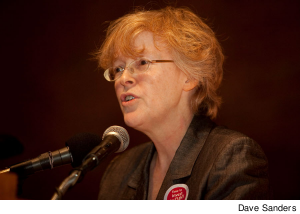 |
“We can change Pathways,” Bowen concluded. “We are not powerless. That’s why we have a union, that’s why we’re here together,” she said to loud applause. “We do not have to say, ‘Okay, we hate it, but it’s done.’” By acting together through the lawsuit, the petition, and in further public actions, she said, the outcome can be changed.
The union petition calls on the Board of Trustees to repeal Pathways at its next meeting, on April 30, and begin a new approach to student transfer. “If we haven’t seen any movement from CUNY, we may need to be there in person at the Board of Trustees meeting,” Bowen concluded. “We’ve seen before that our presence can change the outcomes –- and we may need to be there on April 30.”
The petition, Bowen emphasized, does not simply call for Pathways to be repealed, but also for it to be replaced with a process that respects both faculty governance and the accumulated knowledge of faculty and staff. “One good thing that’s come out of Pathways is a wider recognition of the need to address the facilitation of transfer of credits,” she said. “We have to address that. It’s a complex problem in a complex and big university. [But] it doesn’t need to be addressed in a way that tramples faculty knowledge and experience, and violates the principles of faculty governance and academic freedom.”
UFS Chair Sandi Cooper spoke next, highlighting the depth of faculty opposition to Pathways. Faculty discipline councils, made up of elected department chairs in the sciences, English, history, and foreign languages, “have all written cogent critiques, [warning] of how undergraduate education is going to be destroyed,” she said. “And yet three or four days ago, the chancellor swore to me that it was going swimmingly…and that everybody was happy except for a handful of people.”
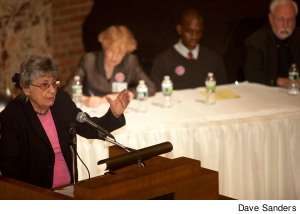 |
Cooper described how the administration consistently rejected UFS efforts to work out a different approach. “The University Faculty Senate proposed at least five different [alternative] modes of proceeding forward,” she said, based on past experience at SUNY and in the California State University system. In those cases, “small groups of faculty from senior and community colleges, who have the largest transfer amongst and between them, [met] in their discipline groups and interdisciplinary groups to come up with an understanding of what range of courses would be acceptable for general education.”
Instead, said Cooper, the top-down process imposed at CUNY “has become a ‘pathway’ for creating struggles between and amongst groups of people” over a scarce number of credits. General education according to the Pathways prescription, she said, “will give students only a vague taste of something outside their majors.”
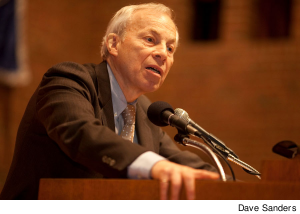 |
Terry Martell, vice chair of the UFS, spoke in personal terms about the decision to go to court. “A lawsuit is not an easy thing,” said Martell. “This is not going to be fun. I don’t look forward to it.” The decision to “put my name, my reputation on this lawsuit,” was not mainly because of issues of faculty responsibility for curriculum, or the expansion of administration control, said Martell – important though those issues are. Instead, he said, the key factor was the damage that Pathways will do to CUNY students.
“Pathways consigns future generations of CUNY students to a grim future in our globalized, competitive world,” said Martell. “I do not want our students to have less of an opportunity because of some ill-conceived, poorly thought-through and poorly executed plan.” What’s at stake, he said, “is not [just] a curriculum issue, this is a fundamental issue of the kind of society that we are going to live in.”
The limits on general education that Pathways imposes will have the biggest impact on the students from the weakest high schools, and on the students from the lowest-income families, argued Martell. “They’re the students that are going to need that fourth credit of English that they’re not going to get, they’re the students that are going to need the college algebra course that is reasonably rigorous that they haven’t gotten in high school,” he asked. “I think it’s a fundamental ultimate educational disaster and I stand against it.”
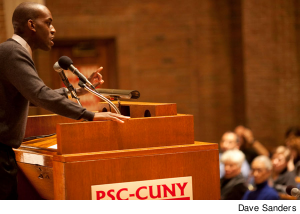 |
Jamell Henderson, a student government senator at BMCC who will enroll at Brooklyn College this fall, argued that Pathways sells CUNY students short. “The path to success is difficult, full of obstacles, full of challenges, the toughest terrain and dangerous situations,” Henderson declared. “But it’s how you’ll become victorious, versus a path that has no obstacles, no challenges, no situations that test the ability of the self.”
Many students enter CUNY without enough preparation for college, said Henderson –- and like him, many have taken remedial classes to close those gaps. In the face of “violence and crime, police brutality, and economic turmoil,” he said, “it is our eagerness to learn that keeps us strong.” But Pathways, he said, “is something that will hurt us. It will not give us the value of education that we need in order to deal with the real world.”
Henderson thanked CUNY faculty and staff for demanding an alternative to Pathways. “If you didn’t care for us, you wouldn’t be sitting right here, right now. You know what’s at stake,” he told the crowd. “And as long as I am a student here in the CUNY system I will stand alongside with you.” Together, he said, “we will be such an insurmountable force that the chancellery will have to stand and listen.”
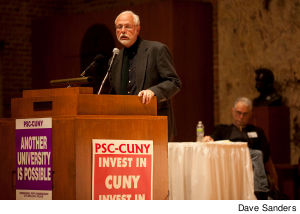 |
Manfred Philipp, professor of chemistry and PSC chapter chair at Lehman, spoke after Henderson. The response to the PSC petition for repeal of Pathways “is a game changer for this University,” Philipp said. “The chancellery, up till now, has been saying that . . . the great majority of the faculty are in favor of Pathways and in favor of what it stands for. This petition drive shows that that is not true.”
And it’s not just the number of signers, said Philipp, who is also a former chair of the UFS: “If you look at some of the names on the petition, it’s clear that many people who were on the chancellery’s own committees, the [Pathways] steering committee and others, are signing the petition. This is an important development.”
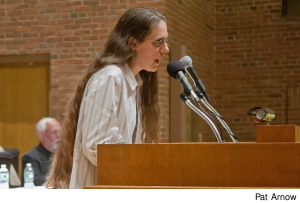 |
Saavik Ford, associate professor of astronomy at BMCC, spoke from the perspective of the classroom. “Pathways, with its three-credit, three-hour science requirement, cannot provide anything but a substandard education,” said Ford. Laboratory classes are “a necessary component of any rigorous science course,” she said, but under Pathways “we are given only three hours with our students” for general education courses. That, she said, is inadequate. Lab classes “are really a form of supervised practice, [and] the time they take cannot be shortened,” she explained. “Nor can we cut regular class hours, which are used to introduce, process and decipher the findings that our students make in the lab.”
“In a society becoming…scientifically and technologically [more] complex, where citizens are asked to make judgments on scientific issues just as a matter of participation in public discourse,” said Ford, to stunt the role of lab classes “is to leave our students disenfranchised as citizens of the future.”
FACULTY, STAFF AND STUDENTS SPEAK OUT
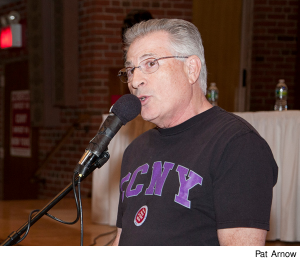 |
When the meeting turned to comments from the floor, the direction of the microphone was symbolic: the mic was set up so that speakers faced the rest of the audience, not just those who had spoken from the stage. This was a chance for CUNY faculty, staff and students to speak with each other about the impact of Pathways, and how to put an alternative in its place.
Steven Jablonsky, chair of the music department at City College, noted that he and Chancellor Goldstein had been students together at CCNY and had benefited from a strong general education program. “The core curriculum at that time…prepared us for a life as citizens of the city of New York,” Jablonsky said. “It also prepared me to go to Harvard University and be on equal footing with anybody from anywhere in the country. It prepared me to be a professor at the greatest college in the city of New York and in the country. And I am very proud of our school and any diminution of what we do is a crime.
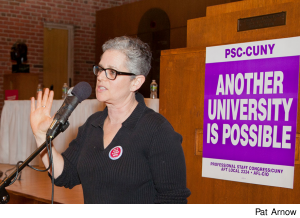 |
Hollis Glaser, professor of speech at BMCC, spoke about “how bad [Pathways] is for faculty collegiality and morale.” In remarks that sparked applause, Glaser said that faculty members “are pitted against each other in this process, fighting for turf and fighting for student credits.” The result, she said, “has been a horrible process.”
One of several students to speak was Amir Khafagy, a student at LaGuardia Community College and a member of Students United For A Free CUNY. “I’m here tonight to express my outrage towards Pathways,” said Khafagy. Pathways, he said, is “a cop-out, an excuse to give students a cheaper, poor quality education.”
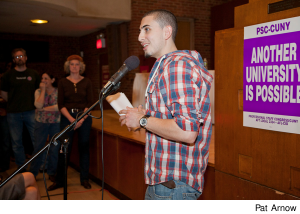 |
“New York students have already been through a Pathways program, and that was the City’s high schools,” Kafagy said to applause. With a student body “predominantly of color, of poor, working-class folks,” he said, CUNY students often haven’t had the opportunities they deserve: “But when we come to college, we strive for the best. And to give us the lowest standard of education, to say you’re not good enough…to learn more, is completely racist and undermines the integrity of the school.”
Nivedita Majumdar, acting chair of the PSC chapter at John Jay College, recounted a conversation with a colleague who said that, even if they were mistaken, that the CUNY administration must sincerely believe that Pathways is in CUNY students’ interest. “Yes,” said Majumdar, “I do believe that they believe it’s good for our students. But this is also a group which believes in a stratified, hierarchical society. They believe that our students are going to occupy a certain stratum of the job market and to do so they…do not need a well-rounded liberal arts education.”
 |
Whatever intentions are at work, she said, in practice Pathways “is an attack on our students, on their right to have a good, well-rounded education. “If Pathways is so wonderful, how come we do not see similar initiatives at Harvard, at Columbia, at NYU?”
Several speakers urged faculty on college-level Pathways committees to vote to approve only courses that they believe meet the educational needs of CUNY students.
Gail August, associate professor of English, ESL and linguistics at Hostos Community College, called Pathways “a classic bait-and-switch.” It is presented to students as a transfer policy, she said but “what they get is a watered-down core curriculum.”
 |
August also criticized “the myth of faculty input” in shaping Pathways. “On October 1 we received the plan [and] by October 15, fifteen days later, the whole college was supposed to respond to the plan,” she said. “The possibility for input was just non-existent.”
The last speaker to come to the microphone was Edwin Román, academic and transfer resources coordinator at Bronx Community College. “I work with faculty on articulation agreements and I’ve been doing that for eight years,” said Román. “I have done articulation for CUNY schools, for SUNY schools and for private schools and I have always made all of our programs fit. ”
“Perhaps the senior colleges could engage the community colleges more on articulation agreements and joint degrees,” Román told Clarion. Adequate staffing for academic advisement is also key: a former transfer advisor (and a CUNY graduate himself), Román told the Town Hall Meeting that “if you catch a student early enough in his or her academic career, you can help them get on the right track.”
“This is a moment in which there is some real hope for taking action,” said Barbara Bowen in closing the evening’s discussion. “We have an important beginning tonight. We will demand nothing less than the repeal of Pathways and its replacement by an alternative.” The large room buzzed with conversation as faculty, staff and students headed out the door. On the way out, they picked up hundreds of copies of the petition to take back to each of their campuses. By the following Monday the number of signers had passed 3,000 and was still growing.

